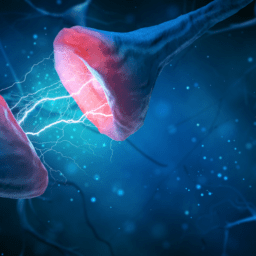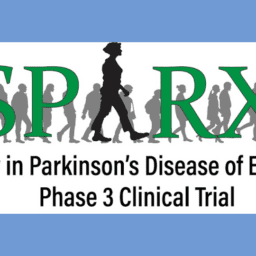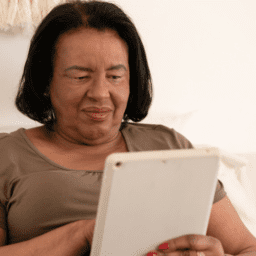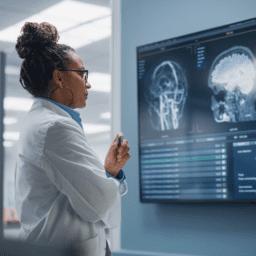More news about GLP1 receptor agonists–the same class of drug as Ozempic–and Parkinson’s. AI’s role in accelerating treatments. Lewy bodies and Parkinson’s “fingerprints.” New pesticides-and-Parkinson’s discoveries. Here’s what’s new in the world of Parkinson’s this month.
SCIENCE AND RESEARCH NEWS
PARKINSON’S PATHOLOGY AND PATHOGENESIS
- A new hypothesis paper published in the Journal of Parkinson’s Disease examines how both “brain-first” and “body-first” models of Parkinson’s may be tied to environmental toxins. Parkinson’s expert Ray Dorsey, MD, who co-authored the paper, says this hypothesis proposes that Parkinson’s is a systemic condition and “that its initial roots likely begin in the nose and in the gut and are tied to environmental factors increasingly recognized as major contributors, if not causes, of [Parkinson’s].”
- Also investigating the links between environmental toxins and Parkinson’s, researchers at UCLA Health found that rare genetic variants associated with the function of lysosomes could increase the risk of Parkinson’s in someone who experiences long-term pesticide exposure.
- In the Journal of Parkinson’s Disease, a team of researchers discuss the double-edged sword of pesticide use in sub-Saharan Africa. While pesticide use helps mitigate famine, it also appears to correlate with increased incidence of Parkinson’s.
- Using computational models, for the first time, researchers have mapped the molecular dynamics of alpha-synuclein to gain a new understanding of what drives alpha-synuclein aggregation, a key factor in the development of Parkinson’s.
- Researchers at the University of Florida discovered a new gene associated with Parkinson’s.
- Published in npj Parkinson’s Disease, a study that explored whether gut microbes are related to mild cognitive impairments (MCI) in people with Parkinson’s found no clear association between the two.
- In other gut health news, findings from a new study that investigated nutrition’s effect on Parkinson’s suggest a healthy diet may support the gut microbiome in a way that positively influences both the risk of Parkinson’s and its progression.
- A study published in npj Parkinson’s Disease investigated the ways elevated levels of alpha-synuclein inhibit mitophagy, which keeps cells from mounting a crucial defensive response to the accumulation of defective mitochondria and can lead to the development of Parkinson’s.
- Also in npj Parkinson’s Disease, a new study explains how perivascular spaces (PVSs) may be useful imaging markers for detecting levodopa-induced dyskinesia in people with Parkinson’s.
- In Nature Communications, researchers from Van Andel Institute share findings about the molecular changes that occur in neurons with Lewy bodies (key pathological hallmarks of Parkinson’s), explaining that these brain cells exhibit a specific gene expression pattern similar to a fingerprint.
- Another study in Nature Communications explored the biological heterogeneity of idiopathic Parkinson’s and may help researchers better understand the biological processes of idiopathic Parkinson’s, which may lead to improved treatments.
- Researchers at Northwestern Medicine published findings in Annals of Neurology explaining how DNA methylation may serve as a biomarker and diagnostic tool for identifying Parkinson’s risk.
- A study published in eBioMedicine adds evidence to the hypothesis that damaged mitochondrial DNA (mtDNA) molecules are predictive of Parkinson’s and Lewy body dementia, rather than a byproduct of the conditions.
PARKINSON’S TREATMENTS
- An exploratory analysis of data from a large Phase 2 clinical trial found that prasinezumab, a monoclonal antibody designed to bind aggregated alpha-synuclein, may have the ability to reduce motor deterioration in people with rapidly progressing Parkinson’s. The researchers point out that further trials are needed to confirm the effects of the antibody; the large Phase 2 trial known as the PADOVA study is currently investigating this.
- Results from a small, Phase 2, one-year study suggested that lixisenatide, a GLP-1 receptor agonist similar to Ozempic (used to help manage diabetes) and Wegovy (used to help reduce obesity), may slow the progression of Parkinson’s motor symptoms. While Parkinson’s experts expressed optimism about the results, published in The New England Journal of Medicine, they emphasized that longer and larger trials are needed to determine the effects and safety of lixisenatide in people with Parkinson’s.
- A study conducted at Ghent University Hospital suggests that transferring healthy bacteria from one person to another via fecal microbiota transplant (FMT) could slow or even reverse the development of Parkinson’s motor symptoms.
- Using artificial intelligence (AI) techniques, researchers at the University of Cambridge have been able to rapidly accelerate–and make much less expensive–the process of screening large chemical libraries for Parkinson’s drug candidates. Their machine learning system also identified five highly potent compounds for further investigation.
- Other researchers using AI to advance Parkinson’s treatments have developed an AI-powered system that can detect early signs of Parkinson’s from brain wave recordings. In two model tests, the system showed 95.79% accuracy in one dataset and 99.83% accuracy in the other when classifying people with Parkinson’s versus people without.
- Results from the Phase 2 PRECEDENT Study found that the investigational, once-daily oral medicine dalzanemdor (SAGE-718) did not show statistically significant differences versus placebo on the primary endpoint in people with Parkinson’s who have mild cognitive impairment.
- Data from the Phase 3 BouNDless trial showed that ND0612, a formation of levodopa/carbidopa administered continuously through a pump under the skin, increased ON time by more than 1.5 hours compared to oral levodopa/carbidopa.
- Another study investigating drug candidates for improved ON/OFF time found that people with Parkinson’s who used tavapadon as an add-on therapy (on top of levodopa) experienced 1.7 hours of improvement in ON time without dyskinesia.
- The U.S. Food and Drug Administration (FDA) cleared NKGen Biotech’s Investigational New Drug application for its SNK01 NK cell therapy, designed for the treatment of Parkinson’s. NKGen Biotech is planning to initiate a Phase 1/2a clinical trial evaluating the safety, tolerability, and exploratory efficacy of SNK01 in people with Parkinson’s.
- A team of students at Northwestern University have invented a pen that can make writing easier for people with Parkinson’s.
- University of Iowa researchers who investigated why deep brain stimulation (DBS) sometimes reduces motor symptoms but impairs cognitive functions discovered that the brain’s subthalamic nucleus is associated not only with movement but also with thoughts and attention. The researchers hope the findings will help reduce the possible cognitive side effects of DBS.
- In a small study, researchers found that which side of the brain receives unilateral DBS influences cognitive side effects of DBS in multiple ways. Among other findings, the authors write “verbal fluency declined after left, but increased after right subthalamic nucleus DBS.”
- Findings from a small study published in Clinical Neurophysiology suggest that transcranial direct current stimulation (tDCS) may help reduce certain aspects of Parkinson’s-related pain.
- The FDA declined to approve Supernus Pharmaceuticals’s SPN-830, an investigational apomorphine infusion device designed to provide continuous treatment of Parkinson’s motor fluctuations. No clinical safety or efficacy issues were identified as a requirement for approval, and Supernus plans to address the FDA’s concerns and resubmit an application for the product.
- Three biobehavioral science researchers at Columbia University’s Teachers College are investigating how exercise and speech therapy can improve quality of life for people with Parkinson’s.
- In a recent interview, Stanford professor Kathleen Poston, MD, discussed the latest in Parkinson’s research and therapies, as well as what excites her most about the future of Parkinson’s treatments.
OTHER NEWS
- Research conducted at University of Turku sheds new light on emotional processing in neurological conditions like Parkinson’s. People with Parkinson’s experience “altered bodily sensations” related to basic emotions (such as anger, happiness, and sadness) more frequently than people without Parkinson’s.
- Using a trabecular bone score (TBS) tool instead of the gold-standard bone mineral density (BMD) exam may help clinicians detect bone loss in people newly diagnosed with Parkinson’s.
- California Assembly member Laura Friedman has proposed a bill that would prohibit the use of paraquat–an herbicide linked to Parkinson’s and banned in more than 60 countries–on fields and orchards in California by January 2026.
- A cross-sectional study published in BMC Geriatrics highlights the prevalence and impacts of anxiety on people with Parkinson’s. Results showed that 40% of participants with Parkinson’s had clinically relevant anxiety. The data also showed that participants who reported more severe anxiety also experienced more severe motor symptoms and lower quality of life.
- A study by the University of the Basque Country and Biobizkaia suggests that optical coherence tomography, an instrument routinely used in ophthalmological tests, may be able to monitor Parkinson’s-related neurodegeneration by measuring a person’s retinal layer. The researchers noted that the results still need to be internationally validated and that resolution of the technology needs to be slightly improved.
- A team of UK-based authors wrote an article for the Journal of Parkinson’s Disease highlighting the importance of Parkinson’s nurses.
- Six genetic counselors wrote an article highlighting factors influencing whether or a not a person shares Parkinson’s genetic testing results with family members.
LIVING WELL STORIES
- In the PBS special “Matter of Mind: My Parkinson’s,” Peter Dunlap-Shohl says exercise is his key to living well with Parkinson’s.
- Likewise, a community of people with Parkinson’s in Cary, NC, says boxing helps them feel their best. “It drives us. It’s like a medicine to us,” one participant said.
- Martha and the Muffins, the band known for their 1980s hit “Echo Beach,” have released a new song, “Slow Emotion,” to raise Parkinson’s awareness.
- Programs and support systems for people living with Parkinson’s in Steamboat Springs, Colorado demonstrate the positive impacts of community involvement.
- In a video interview with their local Seattle news station, John Schofield and his wife, Suzie, discuss the many ways they have adapted and fully lived their lives for decades following John’s Parkinson’s diagnosis at age 33.
- PD Avengers led an effort that turned landmarks around the world blue in recognition of Parkinson’s Awareness Month.
SURVEYS, CLINICAL TRIALS, AND VOLUNTEER OPPORTUNITIES
- Rock Steady Boxing seeks feedback about exercise habits and preferences from people living with young onset Parkinson’s.
- The University College Cork, Ireland and My Moves Matter have launched a study investigating women’s experiences of living with Parkinson’s, including the relationship between of Parkinson’s symptoms, medications, and menstruation. This study is open to women with Parkinson’s who are still menstruating as well as those who are pregnant, perimenopausal, menopausal, or postmenopausal.
- Asklepios Biophamaceutical, Inc. plans a Phase 2 study, REGENERATE-PD, to evaluate a gene-therapy candidate called AAV2-GDNF.
- A 40-person, open label study will investigate a new treatment candidate to help with Parkinson’s dementia.
- Russell Sage College Doctor of Occupational Therapy candidate Emily Peters is conducting a survey as part of her research into development of Parkinson’s symptom management resources. Participating involves following a symptom management protocol for two weeks and completing a survey.
- Charco Neurotech is planning to expand availability of their CUE1 device; they are conducting a survey to evaluate market pricing. Over 3,000 people have used the CUE1, and nearly 90% of users experienced improvement in their Parkinson’s symptoms.
- University of Hawaii’s Digital Health Lab is recruiting participants for two trials assessing keyboard and mouse movements to determine whether these systems can help with Parkinson’s diagnosis and symptom monitoring.
- A team at The University of Calgary is using a new technology to sample and compare the microbiome of people with Parkinson’s to the microbiome of people without Parkinson’s.
- The University of British Columbia is exploring efficacy of the Mediterranean diet as an intervention for Parkinson’s.
- A study in London explores the effect of ballet dancing on motor and non-motor symptoms of Parkinson’s.
- Zydus Lifesciences received approval to begin a phase II trial of an NLRP3 inhibitor for people with Parkinson’s. NLRP3 inhibition is thought to work against neuroinflammation.
- Researchers in the UK and Australia began recruiting participants for a trial aiming to prevent people with REM sleep behavior disorder from developing Parkinson’s by reducing inflammation.
- Researchers in Sweden will begin recruiting participants for a trial of montelukast versafilm: a drug used to treat asthma and allergies. The research will explore whether montelukast has a neuroprotective effect.
- Texas Tech in Lubbock, Texas is undertaking a study about the effects of Parkinson’s on family functioning.
- Researchers in Holland are enrolling participants in a trial evaluating the use of motivational smartphone apps to increase exercise program adherence.
- Inhibikase is recruiting participants for a phase 2 trial of a new c-Abl tyrosine kinase inhibitor. In a press release, Inhibikase says their research “has validated the critical role that c-Abl plays in the initiation and progression of Parkinson’s disease, as well as the potential of IkT-148009 as a promising new approach to disease modification.” This trial is among the first to utilize recently validated alpha-synuclein seed assay tests.
- The International Parkinson and Movement Disorders Society (MDS) is developing a new electronic diary (e-Diary): a digital solution for Parkinson’s. This e-Diary is intended to better characterize how the disease affects daily life. The MDS invites people to participate in a survey to help aid the design of this new tool.
- A new trial studying Gemfibrozil–a drug that decreases fat production in the liver–is set for a phase two clinical trial in people with Parkinson’s. This trial will enroll people between 40 and 75 years of age who have not begun taking medication for Parkinson’s.
- The Speech Accessibility Project (SAP) seeks volunteers for a research initiative aiming to make voice recognition technology more useful for people with diverse speech patterns. More information is available here and here. To determine your participation eligibility, visit the SAP registration page.
- A team of Dutch researchers created PregSpark, a registry for women with Parkinson’s who are pregnant or have recently given birth. The goal is to build an online international pregnancy and Parkinson’s registry. This registry will prospectively and uniformly collect data on the course and outcome of as many as possible pregnancies in women with Parkinson’s. The data will help women with Parkinson’s make informed decisions about pregnancy and improve the quality of care pregnant women with Parkinson’s receive. The PregSpark site is under construction.
- A phase 1b trial is recruiting volunteers for a study of a treatment aiming to influence inflammation.
- Researchers in Norway are investigating the efficacy of ambroxol in people with dementia with Lewy bodies.
- Researchers in the UK, in partnership with the Women’s Parkinson’s Project and MyMovesMatter invite participation in a survey about the experience of menopause for women with Parkinson’s.
- Another study of ambroxol is launching: The DUPARG study is recruiting participants in Groningen, Netherlands.
- A new trial examining the possible neuroprotective effect of exercise has been listed by the University of Nevada.
- University of Rochester Center for Health + Technology is undertaking a survey study to assess the ability of the Parkinson’s Disease-Health Index to measure patient-relevant changes in disease burden over the course of two years. Participants will complete surveys five times over two years and must be over 18, speak English, and have a self-reported or clinical diagnosis of Parkinson’s. More information is available here.
- Researchers at Columbia University’s Irving Medical Center are seeking participants for a study exploring the role of immune response in Parkinson’s. Participation is open to those with and without Parkinson’s and will involve donating blood, a questionnaire, a cognitive test, and a neurological examination. Click here to express interest in participating.
- Johns Hopkins University has announced a trial to evaluate whether levetiracetam can improve symptoms of Parkinson’s psychosis. The trial is not yet recruiting, but intends to begin by September. The trial design features a crossover assignment, meaning every participant will receive an active trial drug for their participation.
- The LUMA trial continues to recruit participants. This trial aims to assess the safety and efficacy of BIIB122 tablets in slowing the progression of early-stage Parkinson’s. This study has sites in the US, China, France, Germany, the Netherlands, Poland, Spain, and the UK.
- The ACTIVATE trial is recruiting participants for a phase 2 trial of BIA 28-6156 in people with GBA mutations. This 78-week trial has site locations in the US, Canada, and Europe.
- In Colorado, a study the Foundation is funding continues to recruit participants. The study explores low-load resistance training with blood flow restriction to help develop exercise interventions for improved quality of life for people with advanced Parkinson’s.
- Washington University School of Medicine is sponsoring a study aiming to enroll participants with idiopathic REM sleep behavior disorder, as well as healthy controls, in preparation for a trial of neuroprotective treatments against synucleinopathies.
- A study in South Carolina hopes to identify brain biomarkers to predict the risk of cognitive change following DBS surgery.
- A survey in Ireland seeks to understand the influence of Parkinson’s symptoms and other factors on quality of life.
- Another survey for those in Ireland seeks to understand how people access information about Parkinson’s.
- A trial sponsored by the University of Aberdeen in Scotland is recruiting participants for a study of the effects of constipation and changes in the microbiota in Parkinson’s.
- Staying Connected through Communication Study: The University of Washington SPEAC Lab invites individuals living with Parkinson’s to answer survey questions about their communication experiences. This is an online survey study that will take about 30-45 minutes. (Paper surveys are also available.) People with Parkinson’s and their family/friends/coworkers will complete SEPARATE surveys, and data are not shared between participants. This study is open to anyone in the US. Participants will be mailed a $25 check upon survey completion.
- PreActive PD Study: This study, available for both English and Spanish speakers, implements an occupational-therapist-delivered physical activity behavior change coaching intervention in people with early-stage Parkinson’s. The study is based upon a recent single-arm cohort feasibility study (Pre-Activate PD/HD) that evaluated acceptability, implementation, and resulting effect estimates of the Pre-Activate PD intervention in 13 participants. The intervention provides one-on-one coaching sessions from an occupational therapist to individuals newly diagnosed with Parkinson’s. The individualized structured support in the sessions is aimed at facilitating and optimizing exercise uptake as part of an effective self-management program.
- Gamma Wave Trial: Sponsored by the Massachusetts Institute of Technology (MIT), this trial investigates the efficacy of a non-invasive method of neuromodulation called Gamma Entrainment Using Sensory Stimulation (GENUS) for managing Parkinson’s motor symptoms. GENUS is administered via light, sound, and tactile stimulation devices and has been tested on cognitively normal individuals and individuals with mild Alzheimer’s; the device was found to be safe for use and effective for entrainment in both populations.
- Deep Brain Stimulation (DBS) and Exercise Study at Barrow Neurological Institute: This study aims to help researchers learn more about how aerobic exercise affects symptoms of Parkinson’s and the quality of life in people who have DBS. They will also look at brain wave activity using the Medtronic Percept DBS device to better understand what changes in the brain might be caused by exercise and how that affects Parkinson’s symptoms. Phoenix-area residents reach out to Markey if interested.
- Colorado Oral Strengthening Device: The University of Colorado Denver is looking for adults with Parkinson’s to participate in a study exploring how a novel low-technology device can increase tongue strength comparable to standard-of-care exercise using tongue depressors but with the kinematics and simple biofeedback of existing high-cost devices. Research has shown that tongue resistance exercises paired with biofeedback result in improved tongue strength to support chewing, control of food and liquid in the mouth, and propulsion of material for a swallow.
- PD GENEration: The Parkinson’s Foundation announces a major expansion of its national study to make genetic testing and counseling more available for people with Parkinson’s. The study (NCT04057794) hopes to enroll 15,000 people in all 50 US states, Puerto Rico, and the Dominican Republic. For questions about enrollment, email genetics@parkinson.org. Know someone who speaks Spanish and wants to learn more and maybe participate in the study? Share this link.
- Parkinson’s Progression Markers Initiative: In an expanded study, the Parkinson’s Progression Markers Initiative (PPMI) is currently working to enroll up to 100,000 people with and without Parkinson’s. The study team is especially seeking to enroll people diagnosed with Parkinson’s in the past two years and who are not yet on treatment, as well as people 60 and older who aren’t living with Parkinson’s but have a risk factor for it (such as a close relative with Parkinson’s, a known Parkinson’s-associated mutation, and/or REM sleep behavior disorder). The observational study is also enrolling people with no known connection to Parkinson’s to serve as a control group.
- TOPAZ (Trial of Parkinson’s and Zoledronic Acid): Caroline Tanner, MD, PhD, is recruiting participants for a new remote clinical trial led by a team of Parkinson’s experts at UCSF in partnership with researchers from across the country. The study aims to help people with Parkinson’s or parkinsonism maintain their independence by reducing the risk of hip fractures. The study will test if zoledronate, an FDA-approved medication for osteoporosis, can prevent fractures in people with Parkinson’s–whether or not they have osteoporosis. To learn more, visit the study website at TOPAZstudy.org, email TOPAZ@ucsf.edu, or call (415) 317-5748.
- A PD Avengers research group is undertaking a new project called Sparks of Experience, designed to be more systematic about collecting and considering the experiences and ideas that come from the curious minds of people living with Parkinson’s. “In the past, these sometimes quirky ideas inspired by lived experience have turned into significant new directions for research. It could be said we are trying to capture serendipity,” the team says. To learn more and get involved, see the flyer here.
- Game-Based Exercise Project: Researchers at the University of Auckland are investigating how games can be used as potential rehabilitation systems. This project aims to develop suitable game-based exercise experiences to help people living with Parkinson’s. If you are 45 or older, living with a chronic condition such as Parkinson’s, and/or are experiencing age-related health conditions, you are invited to participate in a survey that will help the researchers to understand the community’s interest in games and gameplay in the context of exercise and rehabilitation. To learn more and take the 15-minute survey, see the flyer here.
- SPARX3 – A Phase 3 Clinical Trial about Exercise and Parkinson’s: This research team is currently seeking volunteers to participate in a clinical trial about the effects of aerobic exercise on people with Parkinson’s. Learn more and see if you qualify here. For more details, contact Katherine Balfany at SPARX3@ucdenver.edu.
- The University of Oulu and collaborators from Aalborg University, Fraunhofer University, the University of Manchester, the University of Glasgow, the University of Lisbon, and the University of Melbourne are conducting a survey for people with Parkinson’s and care partners about self-care. Complete the survey here to share your self-care strategies and techniques. You can also review ideas submitted by others and add them to your own self-care toolbox.
- Speech and Telemedicine Study: The Purdue Motor Speech Lab
- Parkinson’s and Service Dogs: University of Groningen, Netherlands
- Neurology Study Interest Registry: University of Rochester
For more of what’s new in Parkinson’s news, check out our full series here. [/vc_column_text][/vc_column][/vc_row]
 WANT MORE PRACTICAL ARTICLES LIKE THIS?
WANT MORE PRACTICAL ARTICLES LIKE THIS?
You can learn much more about living well with Parkinson’s today through our Every Victory Counts® suite of resources. Each manual is packed with up-to-date information about everything Parkinson’s. Click the link below to reserve your manual(s).
Thank you to our 2024 Gold Partner, AbbVie, and our Silver Partner, Mitsubishi Tanabe Pharma America, for their ongoing support of these must-have manuals. Additionally, we’d like to thank Barbara and Dale Ankenman, Abby and Ken Dawkins, Bonnie Gibbons, Irwin Narter, Lorraine and J Wilson, and Gail Gitin in loving memory of Gene Gitin for their generous donations that allow us to make these resources available and accessible to all.

















